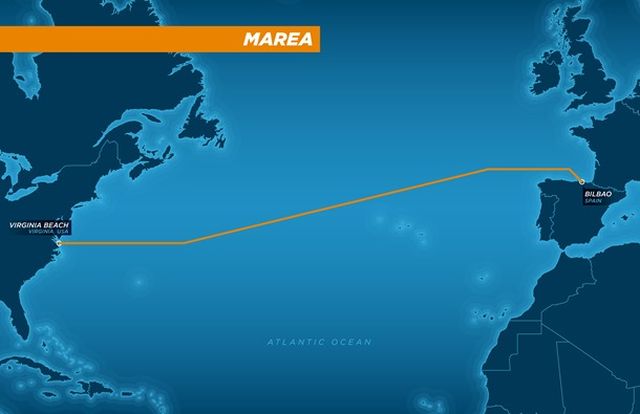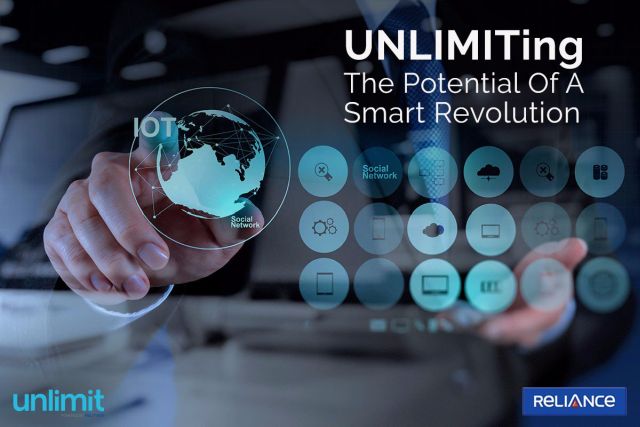
by Editor | May 25, 2021 | Markets, Networking, Online Marketing, Social Media, Technology
 San Francisco : In an incredible feat, Microsoft, Facebook and the telecom infrastructure company Telxius have laid a 6,598 km cable across the Atlantic Ocean that is capable of transmitting 160 terabits of data per second.
San Francisco : In an incredible feat, Microsoft, Facebook and the telecom infrastructure company Telxius have laid a 6,598 km cable across the Atlantic Ocean that is capable of transmitting 160 terabits of data per second.
The companies announced the completion of the highest capacity subsea cable ‘Marea’ (tide) that delivers 16 million times faster Internet than an average home web connection, Microsoft wrote in a blog post.
Microsoft claims that the superfast Internet speed delivered by Marea can stream 71 million HD videos simultaneously.
“Marea comes at a critical time. Submarine cables in the Atlantic already carry 55 per cent more data than trans-Pacific routes and 40 per cent more data than between the US and Latin America. There is no question that the demand for data flows across the Atlantic will continue to increase,” said Brad Smith, President of Microsoft, in a blog post.
For most of the route, the cable — made up of eight pairs of fibre optic cables enclosed by copper — lays on the ocean floor. Some parts are buried to protect from shipping traffic, usually in areas closer to the shore, the company said.
The cable that lies 17,000 feet below the ocean surface and extends between Virginia Beach in the US and the city of Bilbao in Spain, would be operational by early 2018.
Microsoft said the project was completed nearly three times faster than usual, in under two years.
Google has also invested in two cables that run from the US to Japan, covering South America and several Asian countries.
With the Marea cable, Facebook and Microsoft’s investment gives them more control over the vast amounts of data they need to move quickly around the world, the report said.
—IANS

by Editor | May 25, 2021 | World
 Washington : US President Donald Trump on Monday ordered the Education Department to invest at least $200 million annually in grants funding schools in the country so they can expand their teaching in the areas of STEM (science, technology, engineering and math).
Washington : US President Donald Trump on Monday ordered the Education Department to invest at least $200 million annually in grants funding schools in the country so they can expand their teaching in the areas of STEM (science, technology, engineering and math).
“Greater access to STEM and computer science programs will ensure that our children can develop the skills they need to compete and to win in the workforce of tomorrow,” Efe quoted Trump as saying.
The president signed a memorandum instructing his Secretary of Education Betsy DeVos to prioritise educational projects related to STEM and computer science when it comes to distributing funds to schools.
“Currently, more than half of high schools do not offer computer programming, and nearly 40 per cent do not offer physics,” Trump said.
Trump’s daughter and adviser, Ivanka Trump, explained in a telephone conference call that the aim of the initiative is “aligning the skills that are taught in the classroom with the skills that are in demand in the modern economy.”
“So we’re very excited about today’s announcement and towards really focusing on the goal of putting Americans to work and making sure that all Americans get great-paying jobs,” Ivanka Trump added.
The president, for his part, suggested students to engage themselves in the future to “do what you love – but then it’s not work. Because if you love it, it’s not working. It’s like a pleasure.”
—IANS

by Editor | May 25, 2021 | Business, Corporate, Markets, Technology
 Bengaluru : Technology giant Microsoft will make use of Artificial Intelligence (AI) based automated threat investigation system to enhance the security of devices, the company’s top official said on Wednesday here.
Bengaluru : Technology giant Microsoft will make use of Artificial Intelligence (AI) based automated threat investigation system to enhance the security of devices, the company’s top official said on Wednesday here.
“We are taking enterprise security to a new level through automated investigation and response capabilities as a part of Windows Defender Advance Threat Protection (WDATP),” Vineet Durani, Director, Windows and Surface Business, Microsoft India, told reporters here.
“We (Microsoft) are deeply interested in security and our security policies are designed with the perspective that there’s already a breach, thereby staying few steps ahead of whatever is out there,” said Durani.
With the new automation capabilities, WDATP can not only find breaches in security, but can also fix them, he added.
AI-based automated threat investigation system will enable Microsoft users with insight to action against modern day threats while also increasing the efficiency of the machines, the company said.
“With at least 970 million malicious activities being processed by WDATP each day, one can never compromise with security,” the Microsoft executive said.
The company spends over $1 billion each year on security-related research and development, Durani said.
With the official rollout of Windows 10 “Fall Creators” update slated for October, Microsoft wants to stay one step ahead in identifying and preventing security threats, he added.
India is one of the largest victims of cyber crime in the world. The country had faced over 1.4 lakh cyber security attacks in the last three years, according to the Indian Computer Emergency Response Team.
—IANS

by Editor | May 25, 2021 | Business, Business Summit, Corporate, Corporate Buzz, Emerging Businesses, Events, Large Enterprise
 By Sourabh Kulesh,
By Sourabh Kulesh,
Mumbai : Reliance Group’s Unlimit — an Internet of Things (IoT) venture for enterprises — and tech giant IBM on Monday announced a collaboration to co-create IoT solutions for industry verticals, including automotive, insurance, utilities and industrial automation.
The two companies are developing IoT solutions for implementation across Reliance Group companies, addressing key segments such as user-based insurance (Reliance general insurance), asset and vehicle tracking (Reliance commercial finance), tower monitoring (Reliance communications) and transformer maintenance (BSES & Reliance energy).
“With 2.7 billion connected devices and growing, Indian economy, enterprises and consumers are embracing IoT at a rampant pace,” Harriet Green, General Manager, Watson IoT, Customer Engagement and Education, IBM, told reporters here at the first-ever IBM ‘Genius of Things (GoT)’ summit.
“Our collaboration is an example of IBM leading the global IoT movement with a growing ecosystem of clients and partners. This underscores how IBM and ‘Unlimit’ are taking the power of IoT to Indian enterprises and capturing the phenomenon of digital disruption for joint client innovation,” she added.
As part of the collaboration, IBM will provide its Watson IoT Platform to collect and connect data, including sensor data, from devices and provide use-case specific dashboards.
“As India is becoming the hot bed for digital disruption, we are confident that our powerful technology platform, with Watson IoT at its core, will provide enterprises with a flexible, scalable and secure solution,” Juergen Hase, CEO, ‘Unlimit’, told reporters here.
Unlimit will design IoT use cases for various industries in the Indian market and build them on the IBM Watson IoT Platform, which provides device registration, IoT rules, advanced analytics, visualisation, reports and cognitive capabilities for each use case.
As a result, rather than approaching businesses on one-by-one basis, Unlimit will provide customers with access to these capabilities so that they can leverage IoT-driven insights and information for business decisions, create new product offerings and revenue streams.
The Unlimit IoT platform aired at the enterprise users was launched in April this year. Unlimit aims to provide a common platform for vertical industries such as automation, healthcare, agriculture, financial services and asset tracking.
Green said that IBM’s amazing Cloud capabilities enable all communication and infrastructure that is needed to work for the transformation of businesses.
“We have a set of applications that allow us track, record and work together effectively through exceptional software. ‘Watson’, designed especially for IoT, also works as a differentiator for the company,” Green added.
Watson analyses the massive structured and unstructured data to help digital transformation of companies.
IBM also announced key clients and partnerships with Kone, KPIT, Avanijal Agri Automation, Acculi Labs, Tech Mahindra and Arrow Electronics to drive IoT growth in India.
“With an unparalleled, growing global ecosystem of over 6,000 clients, 1,400 partners and 750 IoT patents, IBM is uniquely positioned to lead the IoT revolution across industries and help companies in India plug into critical new revenue streams,” said Karan Bajwa, Managing Director, IBM India/South Asia.
Through a multi-year agreement with IBM, Kone will tap into the IBM IoT Cloud Platform to connect, remotely monitor and optimise the management of millions of elevators, escalators, doors and turnstiles in buildings.
KPIT, a global technology company that specialises in product engineering and IT solutions across several industries, will use IBM’s IoT Continuous Engineering to deliver high-quality designs and connected products efficiently.
Avanijal Agri Automation will use the company’s ‘Irrigation Automation System’ solution to collect and log irrigation data from various sensors on the field for agronomical analysis which helps further enhance the yield on a continuous basis.
Acculi Labs will leverage IBM’s IoT platform to build and scale “Lyfas” — a scalable rural healthcare solution to smooth the flow of data from the edge device to cloud for further analysis and prognostics.
With IBM IoT solutions, Arrow Electronics will offer more than 160 industry-leading cloud services such as artificial intelligence (AI), Blockchain, advanced data analytics and cyber security to customers.
Tech Mahindra is harnessing IBM technology for designing experiences through orchestration of systems, sensors, devices, platforms, external data, back-end systems, analytics engine and much more.
(Sourabh Kulesh can be contacted at sourabh.kulesh@ians.in)
—IANS

by Editor | May 25, 2021 | Investing, Markets, Technology
 San Francisco : Google has been reluctant about sharing how much it spends on self-driving technology but now, the number — over $1 billion — has been accidentally revealed while reviewing documents in the ongoing legal tussle between Google’s Waymo and Uber.
San Francisco : Google has been reluctant about sharing how much it spends on self-driving technology but now, the number — over $1 billion — has been accidentally revealed while reviewing documents in the ongoing legal tussle between Google’s Waymo and Uber.
Google spent a whopping $1.1 billion on developing its self-driving software and hardware, says the recent deposition of Shawn Bananzadeh, a financial analyst at Waymo which was first reported by IEEE Spectrum’s Mark Harris.
Bananzadeh was testifying in the ongoing Waymo’s lawsuit against Uber which claims the ride-hailing company stole intellectual property and trade secrets to develop its own autonomous technology.
According to reports, throughout Bananzadeh’s deposition, every dollar amount was redacted to protect Waymo’s confidential commercial information.
Waymo has patented a technology that will make its self-driving cars soft on the outside if it comes across a situation where there is a possibility of an accident with a human.
Self-driving vehicles constantly communicate with one another to prevent crashes but this is the first time that an industry player came out with a solution to save pedestrians from accident.
Last month, the legal tussle between ride-hailing company Uber and Google’s parent company Alphabet escalated when the court allowed Uber to seek deposition of Alphabet CEO Larry Page for up to four hours.
Waymo filed a lawsuit against Uber earlier in 2017, alleging that the stolen information became the technological basis for the company’s self-driving cars.
—IANS

 San Francisco : In an incredible feat, Microsoft, Facebook and the telecom infrastructure company Telxius have laid a 6,598 km cable across the Atlantic Ocean that is capable of transmitting 160 terabits of data per second.
San Francisco : In an incredible feat, Microsoft, Facebook and the telecom infrastructure company Telxius have laid a 6,598 km cable across the Atlantic Ocean that is capable of transmitting 160 terabits of data per second.



